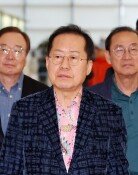Poll Says Education Reform Should Come First
Poll Says Education Reform Should Come First
Posted November. 20, 2007 03:03,
Experts put a priority on education reform, including the normalization of public education, in the next administrations national reform agenda according to a telephone and email survey conducted by Dong-A Ilbo from November 7 through 18 of 55 scholars in the fields of politics, diplomacy, economics, and education. A majority of the respondents (23 respondents) have said education reform is the most urgent national reform agenda for the next administration.
Government reform focused on reducing the size of government agencies came in second (19 respondents), followed by reconsideration of governments policy toward North Korea, including the resolution of North Korean nuclear issues (16 respondents), and strengthening the market economy, including deregulation on companies in the metropolitan area.
The experts also have mentioned strengthening the rule of law and fundamental principles, narrowing the gap between haves and have-nots, reforming the Constitution, reforming real estate policies, improving the U.S.-Korea alliance, and creating jobs, as parts of what should be the national reform agenda.
Regarding education reform, they have suggested giving autonomy to universities, evaluating competitiveness among universities, and implementing a teacher evaluation system as soon as possible, saying, Normalization of public education and reducing the burden of private education require autonomy and competition among schools, not government-led egalitarianism and regulations.
Regarding government reform, the respondents have pointed out the urgent need for a comprehensive overhaul in the public sector by reducing the size of government agencies, aggressive restructuring of diverse state committees, and privatizing state-owned enterprises, saying, There is a need to reduce the size of the government and to reform excessive government spending.
The respondents have also suggested that the Ministries of Education & Human Resources Development, and Unification, the Fair Trade Commission, and The Korea Information Service should be either reduced or abolished. They have added there is a need for consolidation or readjustment of the overlapping functions of the ministries of Labor, Science and Technology, Commerce, Industry and Energy, Information and Communications, and Culture and Tourism.
In a survey conducted of 1,500 adults nationwide on November 17 and commissioned by the Dong-A Ilbo to the Korea Research Center (KRC), education reform have come in first (27.9%) as what should be the next administrations reform agenda, followed by real estate policy reform (13.8%), and government sector reform (13.2%). In addition, a majority (61.6%) said the next president should put a priority on economic growth.
swpark@donga.com sunshade@donga.com







